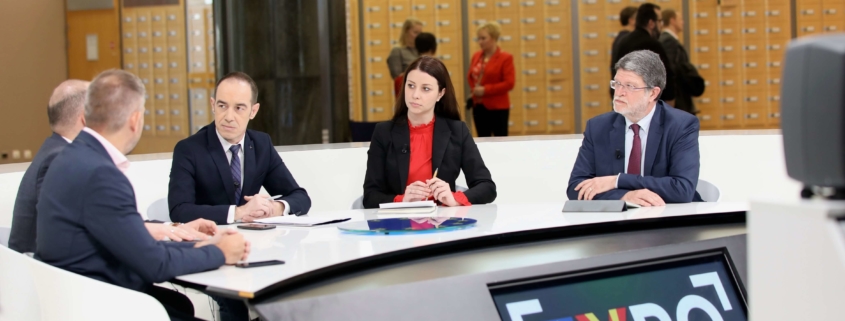In early February 2020, details of the proposed new methodology for the EU enlargement process became publicly known. Following the presentation of the new methodology, MEP Irena Joveva attended a Renew Europe round table discussion where they debated the new methodology with MEPs, representatives of the Western Balkans, Enlargement Commissioner Olivér Várhelyi, Advisor to French President Clément Beaune, representatives of the European Commission and others. On the second day of the roundtable, both MEPs Joveva and dr. Grošelj expressed their satisfaction that the enlargement process would continue, but also hoped that the EU would not “come into a position where the candidates will meet the criteria better than some EU members“.
Nevertheless, this aspect is also important, because, among other reasons for the French ‘no’ in October 2019 was also affected by the decline of the rule of law, democracy and respect for human rights in some of the younger Member States after joining the EU. It seems that we are asking a lot from the Western Balkan countries, what is actually right, but we clearly do not have (sufficiently) effective mechanisms to consolidate or sanction violations of the fundamental values of the Union by Member States.
On the other hand, the visibility and transparency of funds through the IPA instrument should also be improved. IPA II, between 2014-2020, allocated 11.7 billion EUR for structural reforms that help to transform certain sectors in the countries and bring them closer to EU standards. IPA III negotiations are still ongoing. The EC proposal from 2018 envisages an increase in funding to 14.5 billion EUR, but this amount is still a matter of negotiation and – like other matters – is tied to the future multiannual financial framework of the EU.
The new methodology for accession negotiations therefore brings certain innovations. Some of them are positive, while others could also have negative consequences for the countries of the Western Balkans. MEP Joveva was part of panel for the Macedonian television TV TELMA where she mainly welcomed the classification of the chapters into six packages, which should ensure the possible acceleration of the accession processes. According to her, the proposal to increase investments and financial assistance based on the progress of the Balkan countries is also good proposal, as well as the part that talks about accelerated integration in individual EU policies, programs or mechanisms, to which the countries would be involved in the formal adoption process in the EU. Bottom line: These proposals offer some advantages, but on the other hand they change the current process, as it is also possible to regress the accession process and withdraw some EU programs and funds.
The EC now hopes that the Member States will support this proposal at the same time as the start of accession negotiations with Northern Macedonia and Albania, before the May joint summit in Zagreb, at which the EC will prepare an economic and investment development plan for the Western Balkans. If the Council approves the new methodology, the EC will present a framework for draft negotiations with Northern Macedonia and Albania.
* The renewed methodology was discussed in the European Parliament on Monday, 10 February.





Leave a Reply
Want to join the discussion?Feel free to contribute!